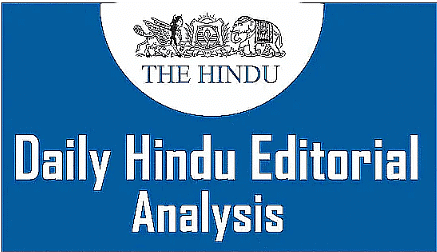UPSC Exam > UPSC Notes > Current Affairs & Hindu Analysis: Daily, Weekly & Monthly > The Hindu Editorial Analysis- 26th September 2023
The Hindu Editorial Analysis- 26th September 2023 | Current Affairs & Hindu Analysis: Daily, Weekly & Monthly - UPSC PDF Download

Expertise over politics
Why in News?
The Cauvery Water Management Authority’s (CWMA) meeting saw a sharp exchange of words between Karnataka and Tamil Nadu over the Mekedatu dam project.
Concept
- Central Government, in exercise of the powers conferred by section 4 of the Inter-State River Water Disputes Act, 1956 had constituted the Cauvery Water Disputes Tribunal in 1990 to adjudicate upon the water dispute regarding the Inter-State river Cauvery and the river valley thereof among the States of Karnataka, Kerala, Tamil Nadu and Union territory of Puducherry;
- The Tribunal investigated the matters referred to it and forwarded to the Central Government a report under sub-section (2) of section 5 of the Act on 2007. The party States filed special leave petitions in the Supreme Court against the said report.
- Supreme Court converted the said special leave petitions into Civil Appeals. Supreme Court pronounced its judgment and directed the Central Government to frame a scheme under section 6A of the Act to implement the Tribunal Award as modified
- In exercise of the powers conferred by section 6A of the said Act, the Central Government notified the Cauvery Water Management Scheme on 2018, inter alia, constituting the ‘Cauvery Water Management Authority’ and the ‘Cauvery Water Regulation Committee’
- The Authority shall exercise such power and shall discharge such duty to do any or all things necessary, sufficient and expedient for securing compliance and implementation of the Award of the Tribunal as modified by the Hon’ble Supreme Court: (i) storage, apportionment, regulation and control of Cauvery waters; (ii) supervision of operation of reservoirs and with regulation of water releases therefrom with the assistance of Regulation Committee; (iii) regulated release by Karnataka, at the inter-State contact point presently identified as Billigundulu gauge and discharge station, located on the common border of Karnataka and Tamil Nadu.

Children, a key yet missed demographic in AI regulation
Why in News?
India is to host the first-ever global summit on Artificial Intelligence (AI) this October. Additionally, as the Chair of the Global Partnership on Artificial Intelligence (GPAI), India will also be hosting the GPAI global summit in December. These events suggest the strategic importance of AI, as it is projected to add $500 billion to India’s economy by 2025, accounting for 10% of the country’s target GDP.
First-ever Global AI summit: Leadership Opportunity through GPAI and G20
- Assuming the chairmanship of GPAI in November, India has gained an unprecedented chance to take the lead in emerging technology. This summit marks a pivotal moment for India to showcase its capabilities in AI and contribute significantly to shaping the global technology landscape.
Diverse Strengths of India in AI
- India’s diversity provides a unique advantage in AI development. The multitude of languages, cultures, and experiences in India enriches the quality of datasets for AI models. Rajeev Chandrasekhar, the Minister of State for Electronics and Information Technology, emphasized the importance of responsible AI to prevent harm while encouraging innovation.
Promoting Collaborative and Participatory AI
- The primary goal of the summit is to promote a collaborative and participatory approach to AI development. This approach seeks to leverage AI’s potential to enhance governance, transform lives, and build global partnerships. India aims to actively shape the direction of technological advancements.
Key Topics and Deliberations at the Summit
- The Global IndiaAI 2023 Summit will feature discussions on a wide array of AI applications, including healthcare, governance, and next-generation electric vehicles. Global experts will also explore future trends in AI research, AI computing systems, investment opportunities, and strategies for nurturing AI talent.
Showcasing IndiaAI Initiatives
- The summit will serve as a platform to showcase India’s vibrant AI initiatives. These include Digital India Bhashini, the India Datasets program, IndiaAI Future Design program for startups, and the IndiaAI FutureSkills program focused on nurturing top-tier AI talent.
Catalyzing India’s AI Landscape and Innovation Ecosystem
- Drawing inspiration from the success of past editions of the SemiconIndia conference, the Global IndiaAI summit aims to catalyze India’s AI landscape and innovation ecosystem. This event is expected to become a significant fixture on the global AI industry calendar.
Framework of IndiaAI Initiative
- Under the IndiaAI program, the government has engaged in consultations with industry stakeholders to launch the India Datasets program. The initiative involves the establishment of working groups comprising government representatives, academic institutions, and startups. These groups have outlined a comprehensive framework for IndiaAI, encompassing AI in Governance, AI Computing & Systems, Data for AI, AI IP & Innovation, and Skilling in AI. These pillars will constitute a key part of the summit’s agenda.
The document The Hindu Editorial Analysis- 26th September 2023 | Current Affairs & Hindu Analysis: Daily, Weekly & Monthly - UPSC is a part of the UPSC Course Current Affairs & Hindu Analysis: Daily, Weekly & Monthly.
All you need of UPSC at this link: UPSC
|
38 videos|5293 docs|1118 tests
|
FAQs on The Hindu Editorial Analysis- 26th September 2023 - Current Affairs & Hindu Analysis: Daily, Weekly & Monthly - UPSC
| 1. Why are children considered a key demographic in AI regulation? |  |
Ans. Children are considered a key demographic in AI regulation because they are one of the most vulnerable groups when it comes to the potential risks and harms associated with artificial intelligence. AI systems can have a significant impact on children's privacy, safety, and well-being. Therefore, it is crucial to have specific regulations and safeguards in place to protect them.
| 2. What are some potential risks and harms that AI can pose to children? |  |
Ans. AI can pose several potential risks and harms to children. Some of the common ones include invasion of privacy through data collection and tracking, exposure to harmful content, online bullying and harassment, manipulation through targeted advertising, and potential biases in AI systems that can perpetuate stereotypes or discriminatory practices.
| 3. How can AI regulations specifically address the needs of children? |  |
Ans. AI regulations can specifically address the needs of children by incorporating measures such as strict data protection and privacy laws, age-appropriate content filtering and moderation, robust parental consent mechanisms, transparency requirements for AI systems, and guidelines to ensure that AI algorithms do not discriminate against children or reinforce harmful biases.
| 4. What role can governments play in regulating AI for children? |  |
Ans. Governments have a crucial role to play in regulating AI for children. They can establish comprehensive legal frameworks that outline the rights and protections for children in the context of AI. Governments can also create specialized regulatory bodies or agencies to oversee and enforce these regulations, conduct audits of AI systems used by companies targeting children, and promote public awareness and education on AI-related risks and safeguards.
| 5. How can AI regulations for children be effectively implemented and enforced? |  |
Ans. Effective implementation and enforcement of AI regulations for children require a collaborative effort from various stakeholders. This includes governments, regulatory bodies, technology companies, educational institutions, and civil society organizations. Regular monitoring, auditing, and reporting of AI systems, along with penalties for non-compliance, can help ensure that regulations are followed. Additionally, continuous research and development in the field of AI ethics can contribute to the improvement of regulations and their enforcement.
Related Searches





















